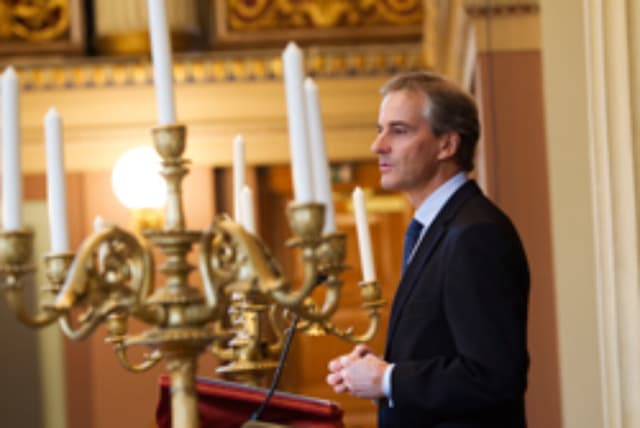Nations "Need to Act" to Mitigate Effects of Climate Change, States Jonas Ghar Støre, Norwegian Minister of Foreign Affairs

Octrober 13, 2010
In an opening speech before the Kavli Prize Science Forum: 2010 in Oslo, Norway’s Minister of Foreign Affairs, Jonas Ghar Støre, pressed the need for recognizing the wide impact of global climate change and gave particular focus to the Arctic region, where melting ice is creating a landscape with new risks, opportunities and challenges.
“Among the most complex of today’s global issues are climate change and the question of how to build sustainable economies and societies for the future,” he said. “As governments we are called to order by science, if I may say so. Scientists will continue to weigh the evidence. But I believe the message is clear: man-made climate change is beyond doubt – and we need to act.”
Støre’s remarks were given before an audience that included scientists and leaders key to influencing science policy in the U.S., Europe and Asia. Turning specifically to how climate change is affecting the Arctic region, Støre said, “The High North and the Arctic range are the Norwegian Government’s number one foreign policy priority. This is the part of Norway’s neighboring areas where most [climate] change is taking place, where we have the most interests to safeguard, and where Norway has both a responsibility and the ability to make a difference.”
With Norway itself among the nations whose territory reaches into the Arctic, he emphasized the importance of scientific guidance as melting ice waters open the Arctic region to greater maritime traffic and potential development.
“[We] need scientists to examine more closely the impact of developing new renewable and non-renewable resources in the Arctic, and of using new commercial sea routes as the sea ice recedes further. Otherwise it will not be possible to ensure sustainable economic development in this region. Knowledge is key for developing the region and if we don’t have the necessary knowledge, we must invest in new knowledge.”
Støre also stressed the importance of not being impeded by what he termed “merchants of doubt.”
“One key hurdle on the road to scientific decision-making based on scientific input is the power of the so-called ‘merchants of doubt’ – those forces who actively use uncertainty – which is a sound thing in science – to play down the issue, or even to kill the issue,” he stated. “… Now, the same forces are out playing in the climate change debate.
“Of course, we must be vigilant and ready to scrutinize science, as well as politics. The recently published assessment of the IPPC – the UN International Panel on Climate Change -- has criticized the way the IPCC has been working. I regard the assessment as important input to the ongoing efforts to improve the quality of science. However, these findings should not draw focus away from proper action. On an issue such as climate change, we have to let the precautionary principle lead the way. And we must not forget: the recent assessment has not in any way questioned the very basic, underlying fact that climate change is caused by human beings. And that only human beings can change it. “
Støre’s remarks preceded a keynote address by John P. Holdren, Science Advisor to President Barack Obama and Director of the White House Office of Science and Technology Policy, Executive Office of the President. Holdren also addressed global climate change, which he referred to as “global climate disruption” – a term he regarded as more illustrative and accurate. Holdren provided insight into why it is a priority to the Obama administration and pressed as well for an international effort to mitigate, and adapt to, its effects.
The Kavli Prize Science Forum is a biennial international forum to facilitate high-level, global discussion of major topics on science and science policy. Held in Oslo, Norway, in conjunction with Kavli Prize Week and the Kavli Prize Ceremony, it is a partnership between the Norwegian Academy of Science and Letters, The Kavli Foundation and the Norwegian Ministry of Education and Research.
For the complete opening address and slide show/audio presentation, click here.
